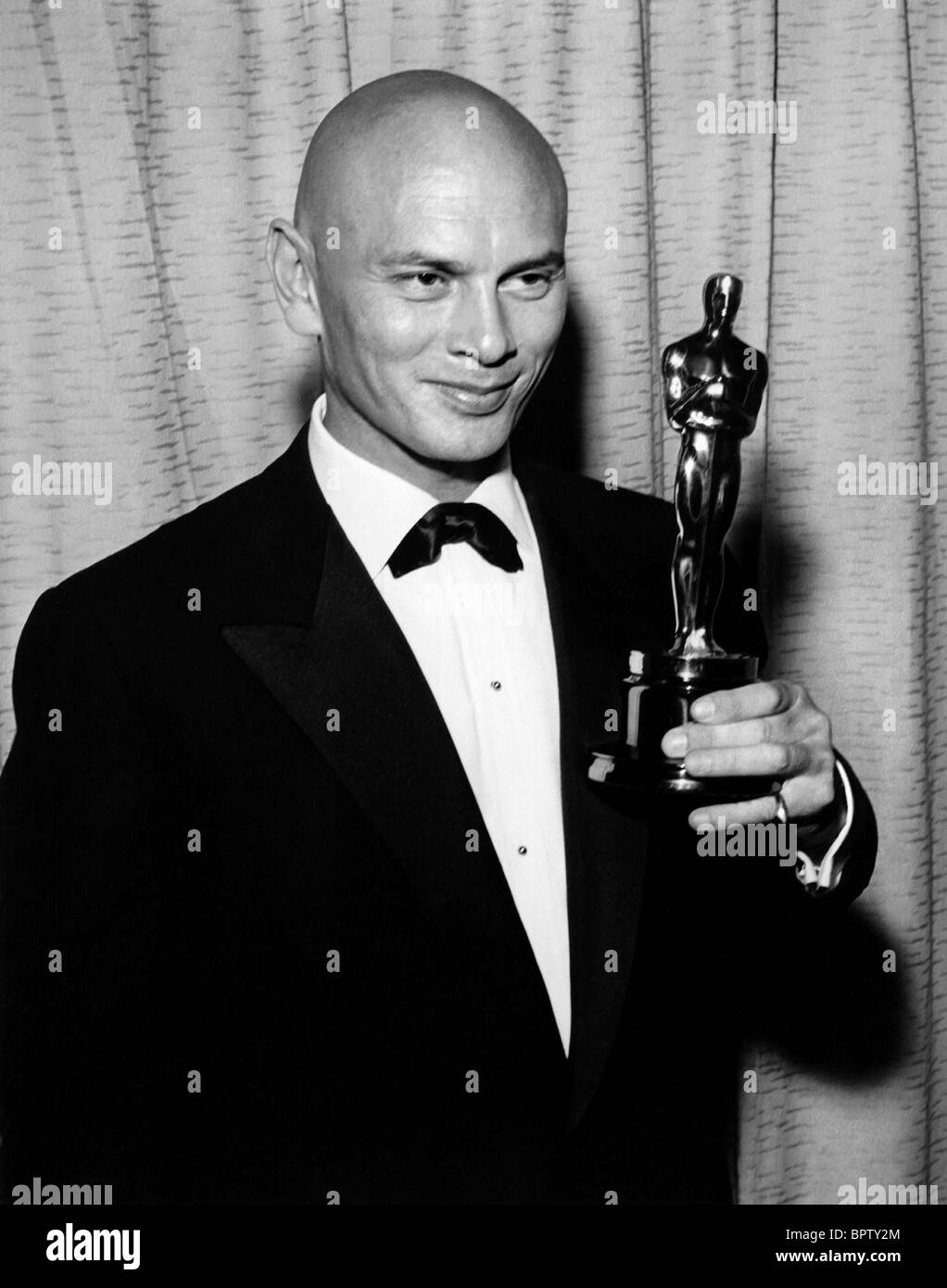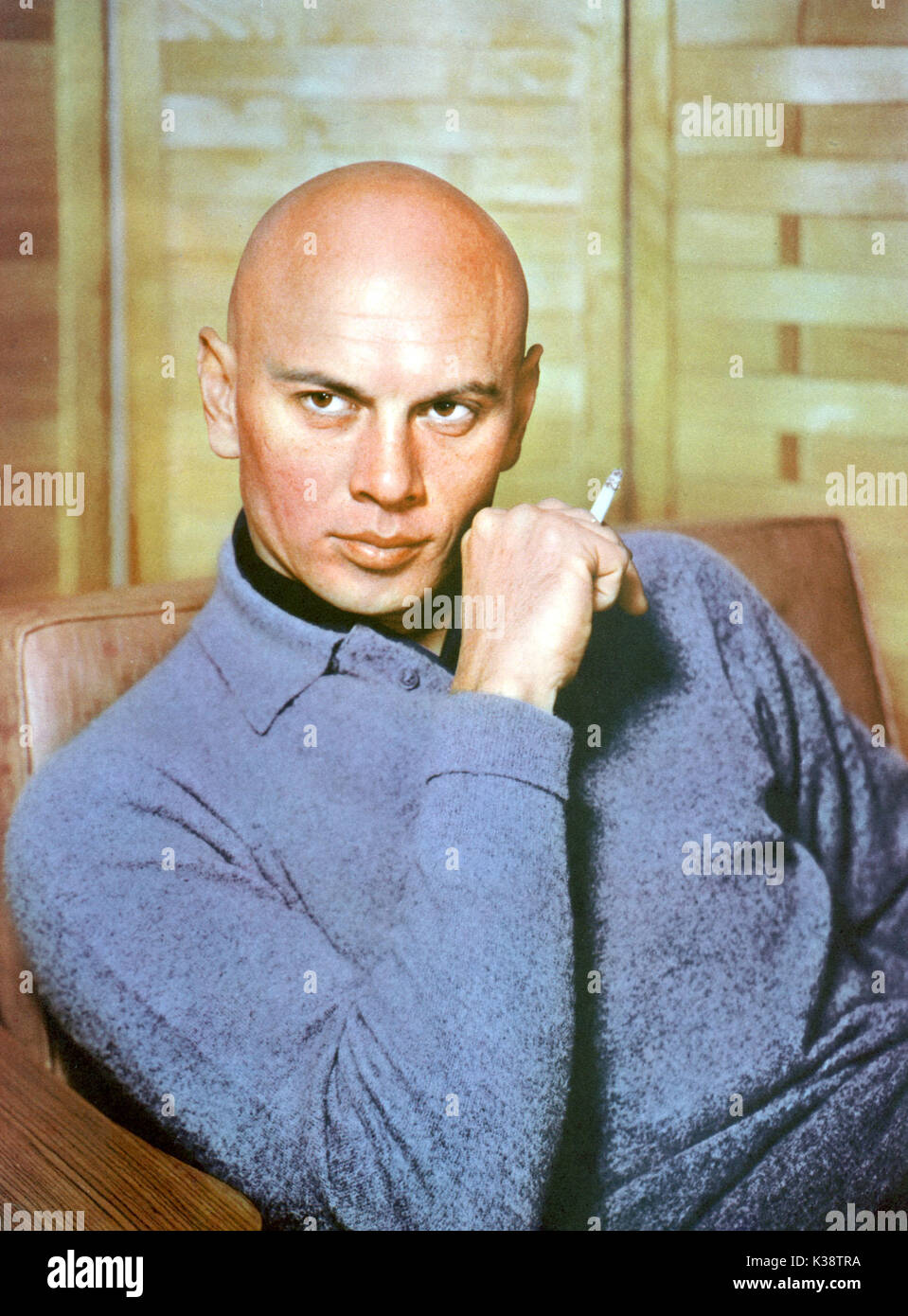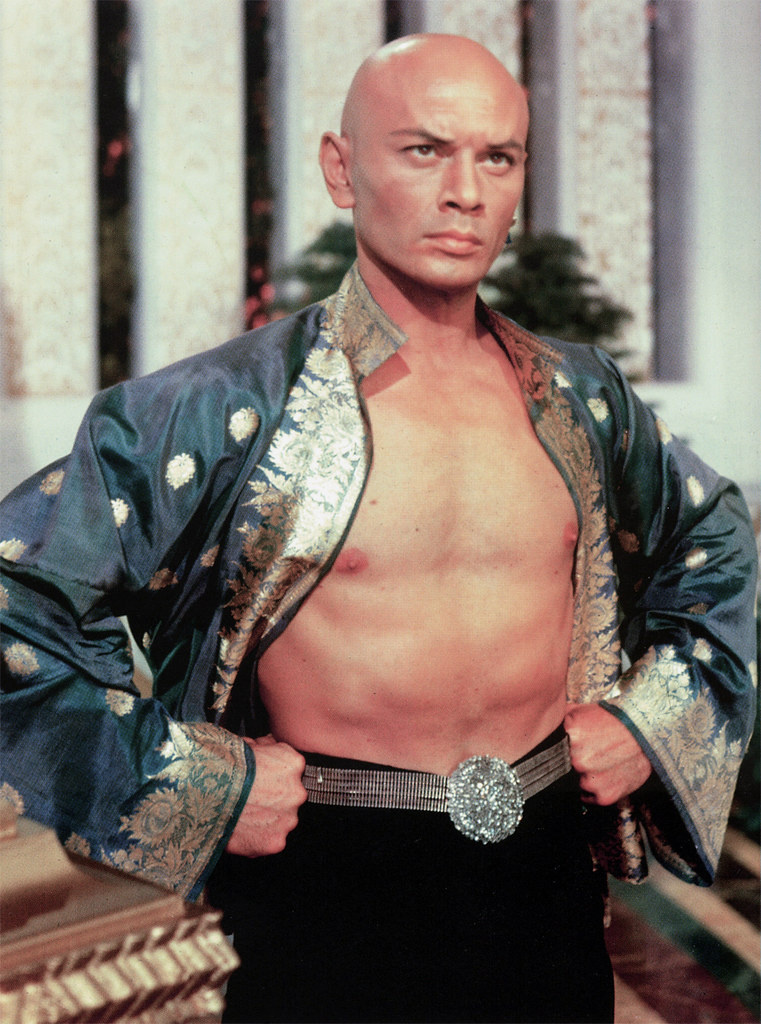Can one role truly define an actor's legacy? For Yul Brynner, the answer is a resounding yes. His portrayal of King Mongkut of Siam in "The King and I" not only cemented his place in theatrical and cinematic history but also created an enduring image that would follow him throughout his career. It was a role he inhabited with such commanding presence and regal bearing that it became almost impossible to separate the actor from the character.
Born Yuliy Borisovich Briner on July 11, 1920, in Vladivostok, Russia, Yul Brynners early life was shrouded in a self-constructed mystique. He spun tales of Mongolian heritage and Swiss-Mongolian parentage, adding an air of exoticism to his already captivating persona. Raised in Russia, China, and France, he abandoned formal education to pursue a life of music, initially working as a guitarist in Parisian nightclubs and even as a trapeze artist with a French circus. These early experiences undoubtedly contributed to his later stage presence and his ability to command attention.
| Category | Information |
|---|---|
| Full Name | Yuliy Borisovich Briner (Yul Brynner) |
| Date of Birth | July 11, 1920 |
| Place of Birth | Vladivostok, Russia |
| Date of Death | October 10, 1985 |
| Place of Death | New York City, New York, USA |
| Occupation | Actor |
| Years Active | 1941-1985 |
| Spouse(s) | Virginia Gilmore (m. 1944-1960) Doris Kleiner (m. 1960-1967) Jacqueline Thion de la Chaume (m. 1971-1981) Kathy Lee (m. 1983-1985) |
| Children | Rock Brynner, Victoria Brynner, Lark Brynner, Mia Brynner, Melody Brynner |
| Notable Roles | King Mongkut of Siam in "The King and I", Rameses II in "The Ten Commandments", Chris Adams in "The Magnificent Seven" |
| Awards | Academy Award for Best Actor (The King and I, 1956), Tony Award for Best Actor in a Musical (The King and I) |
| Signature Look | Shaved Head |
| Nationality | American (of Swiss and Russian descent) |
| Reference | Encyclopdia Britannica - Yul Brynner |
Brynner's journey to stardom wasn't immediate. He began his acting career in the early 1940s, working in summer stock and making uncredited appearances in films. However, his breakthrough arrived in 1951 when he landed the role of the King of Siam in the Rodgers and Hammerstein musical "The King and I" on Broadway. This role catapulted him to fame, earning him immense critical acclaim and numerous awards. He possessed the rare ability to portray both the character's imposing authority and his underlying vulnerability, creating a complex and captivating stage presence.
- Dan Snyders Wealth From Nfl Owner To Billionaire Beyond
- Josephine Earps Net Worth Life Tombstone Truth Revealed
The success of "The King and I" on Broadway paved the way for the 1956 film adaptation, where Brynner reprised his role, solidifying his status as a major Hollywood star. His performance in the film earned him the Academy Award for Best Actor, a testament to his captivating portrayal of the conflicted monarch. It also cemented his signature look: a completely shaved head, a style choice he initially made for the stage production but which became synonymous with his image. That iconic bald head, combined with his piercing gaze and commanding stature, made him instantly recognizable.
While "The King and I" remained his most iconic role, Yul Brynner enjoyed a diverse and successful film career. He starred in a range of notable films, showcasing his versatility as an actor. He portrayed the Pharaoh Rameses II in Cecil B. DeMille's epic "The Ten Commandments" (1956), a role that further solidified his image as a powerful and exotic figure. He also appeared in "Anastasia" (1956), "The Brothers Karamazov" (1958), and "The Buccaneer" (1958), demonstrating his ability to tackle a variety of genres and characters. His range was remarkable, from historical epics to dramatic character studies.
However, it was his role as Chris Adams in John Sturges's classic Western "The Magnificent Seven" (1960) that showcased his ability to lead an ensemble cast and embody a stoic, charismatic hero. Leading a group of gunslingers hired to protect a Mexican village from bandits, Brynners quiet intensity and commanding presence anchored the film. "The Magnificent Seven" became a cultural touchstone, and his performance as Chris Adams remains one of his most memorable.
- Rashad Jamals Pain Agony Drops Listen Now New Music
- Rapper Magoo Of Timbaland Magoo Fame Dead At 50 A Tribute
He continued to work steadily in film throughout the 1960s and 1970s, appearing in sequels like "Return of the Seven" (1966) and action films such as "Villa Rides" (1968). While these films may not have reached the same critical heights as his earlier work, they demonstrated his enduring appeal as a leading man. He embraced his established persona, often playing strong, enigmatic characters with a hint of danger.
Despite his success in film, Yul Brynner never abandoned the stage. He returned to "The King and I" countless times, performing the role over 4,600 times throughout his career. This unwavering commitment to the character cemented his legacy and solidified his connection with audiences worldwide. He clearly understood the power of the role and the profound impact it had on his career.
Beyond his acting career, Yul Brynner was known for his flamboyant personality and his penchant for embellishing his personal history. He cultivated an air of mystery around his past, often telling conflicting stories about his origins and experiences. He reveled in teasing those he considered gullible, creating a persona that was as captivating off-screen as it was on-screen. This carefully crafted image contributed to his allure and further enhanced his mystique.
In his private life, Brynner was married four times and had several children. He was also a talented photographer and a skilled guitarist, demonstrating his diverse range of interests and abilities. While he largely remained detached from social and political movements, his artistic contributions and his iconic status made him a significant figure in popular culture.
Tragically, Yul Brynner was diagnosed with lung cancer in the early 1980s, a consequence of his heavy smoking habit. In a powerful public service announcement, he urged viewers to quit smoking, stating that he would be dead by the time the advertisement aired. His words were a stark reminder of the devastating consequences of the disease and served as a poignant farewell from a beloved performer.
Yul Brynner passed away on October 10, 1985, in New York City, at the age of 65. His death marked the end of an era, leaving behind a legacy of memorable performances and an enduring image as one of Hollywood's most iconic stars. His final performance of "The King and I" took place just months before his death, a testament to his dedication and his enduring love for the role that defined his career.
His impact on popular culture continues to be felt today. On September 28, 2012, a life-sized statue of Brynner was erected in Yul Brynner Park in Vladivostok, his birthplace. Sculptor Aleksei Bokiy captured Brynner's likeness as King Mongkut of Siam, forever immortalizing his most famous role. His son, Rock Brynner, attended the ceremony, celebrating his father's remarkable life and career. The statue stands as a reminder of Yul Brynner's extraordinary talent and his enduring legacy as a true icon of stage and screen.
Yul Brynner was not simply an actor; he was a performer who captivated audiences with his undeniable charisma, his commanding presence, and his ability to embody a wide range of characters. While he played numerous roles throughout his career, it was his portrayal of King Mongkut of Siam that truly cemented his place in history. He shaved his head for the role of "The King and I," runs for 1,246 performances, winning 5 Tony Awards; and it became his signature look. His legacy continues to inspire and entertain audiences around the world.
Actor Yul Brynner had a historic Broadway career, spending 34 years acting as King Mongkut in "The King and I" on Broadway, and starring in the 1956 film adaptation. The star Yul Brynner would lead the cast of the 1956 film version, and play the role over 4,200 times. He won both the Tony Award and Academy Award, that made him a legendry actor in industry. A granite monument of Yul Brynner was installed near the house where the actor was born in 2012, marking his 92nd Birthday.
Born in their hometown of Vladivostok and named Yuliy after his grandfather, Jules Briner. Brynners son, Rock, attended the ceremony of statue in 2012. The statue depicts Brynner as bald and looking a lot like the character he played 4,625 times: The king in "The King and I". He was best known for his portrayal of Mongkut, King of Siam, in the Rodgers and Hammerstein musical "The King and I", for which he won an academy award for best actor (1956).
Exotic leading man of American films, famed as much for his completely bald head as for his performances, Yul Brynner masked much of his life in mystery and outright lies designed to tease people he considered gullible. Throughout his life, Brynner had a limited participation in social movements or historical events, but his legacy endures as an icon of actor. Yul Brynner (n rus , transliterat; Yuliy Borisovich Briner, 10 octombrie 1985, New York City, New York, SUA) a fost un actor american de origine elveian i rus.
Yul Brynner was an actor known for his roles in "The King and I," "The Ten Commandments" and "The Magnificent Seven". He worked mostly in American films, and is also known for his roles in "Anastasia", "The Brothers Karamazov", "The Buccaneer", "The Magnificent Seven", "The Return of the Seven", "Villa Rides".



Detail Author:
- Name : Nathaniel Bashirian
- Username : myrtice73
- Email : hulda38@hotmail.com
- Birthdate : 1982-02-15
- Address : 68107 Bins Curve Durganchester, HI 06673
- Phone : 1-802-209-9085
- Company : Aufderhar Group
- Job : Nuclear Monitoring Technician
- Bio : Illum nihil sed tempore. Sit voluptatem illo quos hic aut aut. Quia minima non aperiam dolores. Enim facere a et illum quia.
Socials
facebook:
- url : https://facebook.com/demarco_grant
- username : demarco_grant
- bio : Eveniet repellat illum suscipit corrupti.
- followers : 2210
- following : 2973
tiktok:
- url : https://tiktok.com/@demarco8535
- username : demarco8535
- bio : Vero aut sed velit nihil qui eos molestiae.
- followers : 4359
- following : 1793
linkedin:
- url : https://linkedin.com/in/demarco_grant
- username : demarco_grant
- bio : Sapiente nihil odio veniam enim.
- followers : 1394
- following : 431